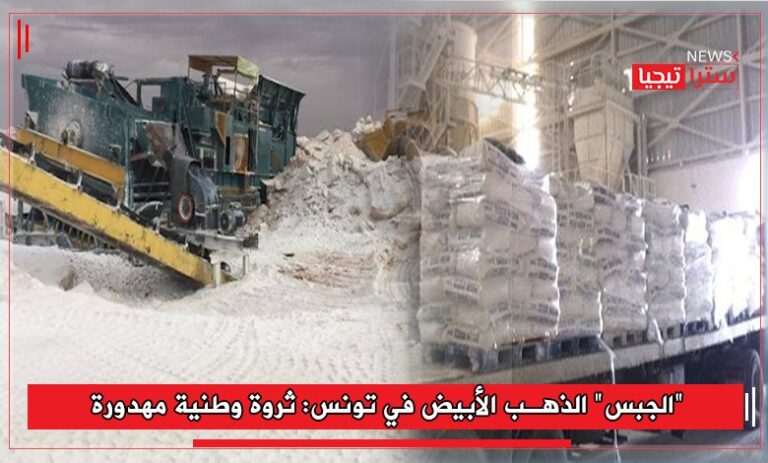by Sabrine Al Ajroudi, Department of Strategic Research and Studies
May 7, 2024
Tunisia boasts the world’s second-largest reserve of gypsum, also known as the “white gold,” located in the region of Tataouine, specifically in the desert. Itsqualityreaches up to 90%, allowing the country to meetitsneeds for the next 400 years, according to Abdel Salam Lazhar, president of the Tunisia Hope Association for Job Seekers in Tataouine
In 2019, the president of the association expressedastonishmentat the national authorities’ failure to invest in thissector and theirrelinquishment of such a wealth to privateentities. He emphasized the need for state institutions to invest in thissector by formingpartnershipswithforeign countries. Such action wouldrevitalize the economy and contribute to improving the Tunisiancurrency, especiallygiven the global importance of gypsum, whichcouldelevateTunisia to compete in thisfield
One of the challenges facing the gypsumindustryis the lack of public fundingfrom the state, makingitextremelydifficult for industrialists to maintaintheirworkforce
In Tataouine, specifically in the Wadi Al Gharregion, there are twofactorieslocatedapproximately 15 km from the city, providingaround 500 jobs in processing and manufacturingthismaterial. Gypsum has been used for centuries in the construction of important desert palaces and Berbermountain villages, which are nowsignificanttourist destinations in Tunisia, contributing to the influx of foreigncurrencyinto the country
On November 26, 2018, thesefactoriesreceived a notice from the National Petroleum Distribution Companystatingtheirinability to provideheavy fuel oil, whichis essential for gypsum production. This rendered the continuation of gypsum production impossible. Aftermonths of shutdown, a solution wasreached to address the crisisat the HammamiGypsumFactory, whichhad long been inactive, resulting in the loss of 500 jobs. However, protestsagainst the poor conditions of workerspersisted, demandingimprovements in theirfinancial situation in line withgovernment-approvedraises. Moreover, gypsumis a highlydemandedmaterialbothdomestically and internationally, withhighprices
Investment in thissectorisscarcedespiteits national and international importance, attributed, according to the State Secretary for Mines, Hashem Al-Hamidi, to the stringent conditions imposed by the state on investors, whichhinderinvestmentopportunities. The ministry has been tighteningregulations on investors, cancelling five exploitation permits due to violations. However, efforts have been made to reduce violations thatdiscourageinvestorsfromentering the sector. This onlyapplies to areas of 400 hectares grantedduringlicenses
As part of the Ministry of Energy plans, investors were to be granted six exploitation permits to produce 800,000 tons of gypsum, with an estimated investment value of 60 million dinars, creating around 500 job opportunities
There has been a clear lack of transparency since independence regarding data concerning the gypsum sector, including its trade exchanges and investment information. This may lead to interpretations of possible irregularities in this vital sector, whichcouldboost the country’seconomy by openingdoors to foreigninvestorswithoutsubjectingthem to strict investmentlawsthat serve no purposewhen not enforced. This amounts to the relinquishment of a crucial resource for Tunisia to corruptindividuals and prevents the country frombenefitingfromit. Calls have been made in pastyears to the Minister of Energyand Mines to provide the necessary data on gypsum, but they have remainedmererequests on paper, yet to beaddressed to thisday

